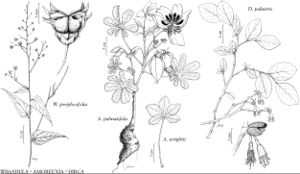Difference between revisions of "Wissadula"
Malvenfam., 24. 1787.
imported>Volume Importer |
RevisionBot (talk | contribs) m (Bot: Adding category Revised Since Print) |
||
| Line 112: | Line 112: | ||
}}<!-- | }}<!-- | ||
| − | -->[[Category:Treatment]][[Category:Malvaceae subfam. Malvoideae]] | + | --> |
| + | |||
| + | [[Category:Treatment]] | ||
| + | [[Category:Malvaceae subfam. Malvoideae]] | ||
| + | [[Category:Revised Since Print]] | ||
Latest revision as of 14:27, 15 December 2020
| Taxon | Illustrator ⠉ | |
|---|---|---|
 | Wissadula periplocifolia Amoreuxia wrightii Amoreuxia palmatifida Dirca palustris | Linny Heagy Linny Heagy Linny Heagy Linny Heagy |
Subshrubs [perennial herbs]. Stems usually erect, hairy [glabrate], not viscid. Leaves distalmost sometimes subsessile; stipules usually persistent, filiform, subulate, or minute; blade broadly ovate to ovate-triangular [narrowly triangular], unlobed, base cordate, margins entire [crenate-dentate], surfaces usually stellate-hairy [sometimes glabrate]. Inflorescences terminal panicles or racemes; involucel absent. Flowers: calyx not accrescent, not inflated, shorter than mature fruits, lobes not ribbed, triangular; corolla usually yellowish, sometimes white, rotate; staminal column exserted; style 3–6-branched; stigmas capitate. Fruits schizocarps, erect, not inflated, obovoid, not indurate; mericarps 3–6, 2-celled, apex bulbous-apiculate, proximal cell indehiscent, distal cell dehiscent. Seeds (1–) 3 per mericarp, lower cell 1-seeded, upper cell usually 2-seeded, hairy, proximal seed relatively more densely hairy. x = 7.
Distribution
sc United States, Mexico, West Indies, South America, s Asia, Africa
Discussion
Species 25 (3 in the flora).
Selected References
Key
| 1 | Leaf blades 2.5–3.5 cm, apex acute to subobtuse; stipules minute; petals yellow, fading to orange. | Wissadula parvifolia |
| 1 | Leaf blades 4–11 cm, apex acute or acuminate; stipules 4–12 mm; petals usually yellowish or white, sometimes with dark red basal spot | > 2 |
| 2 | Leaf blades broadly ovate, base deeply cordate (except uppermost), margins curved; petals yellowish; stipules 7–12 mm. | Wissadula hernandioides |
| 2 | Leaf blades ovate-triangular, base shallowly cordate, margins straight; petals yellowish or white, sometimes with dark red basal spot; stipules 4–5 mm. | Wissadula periplocifolia |